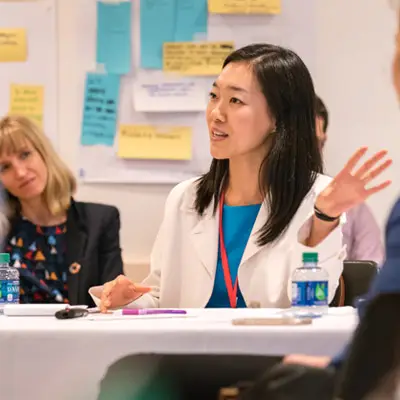2023 Global Solutions Forum

On February 15th, representatives from SDSN’s national and regional networks - including Canada, Mexico, South Africa, Sahel and Mediterranean - shared their innovative and transformative solutions, thus showing how they contribute to the achievement of the SDGs. These solutions were previously selected through a competitive process among SDSN networks worldwide.
The GSF2023 opened with welcome remarks from Jeffrey Sachs, president SDSN, and Eve de la Mothe Karoubi, Head of the Networks Program, SDSN. During the event, each institution presented their solution followed by a discussion with a “Solutions Committee” composed of three health and SDGs experts: Maria Elena Bottazzi (Texas Children’s Hospital Center for Vaccine Development); Michael Shank (Carbon Neutral Cities Alliance); and Susanne Grimm (Competence Centre Health and Social Protection, GIZ). The debate was moderated by Clara Marín, from ISGlobal Barcelona Institute for Global Health.
For the second year in a row, SDSN partnered with the Global Sustainable Technology & Innovation Community (G-STIC), the German Corporation for International Cooperation (GIZ), and PANORAMA - Solutions for a Healthy Planet, a partnership initiative to support peer-peer exchange around solutions.
The event was held in-person at G-STIC Rio in Brazil (and also live streamed) reaching an audience of fellow academics who can help translate projects to other contexts, business leaders who are able to deploy at scale, policymakers who can help shape regulatory foundations, and non-governmental actors, including donors, civil society, and youth. The concept of scalable solutions that lies at the heart of the GSF seeks to inspire and connect the diverse and global audience, equipping them with clear opportunities for action within the framework of the latest available science.
Watch the Event
Solutions from the 2023 Global Solutions Forum
-
KaziHealth: A teacher’s Health Promotion Programme
Nelson Mandela University
Network: SDSN South Africa
Designed specifically for teachers in low-resourced settings, the KaziHealth programme consists of a behaviour change model that targets health behaviours, as well as perceived levels of stress and mental health outcomes. This includes a health risk assessment tool to capture the assessment data, lifestyle coaching and the KaziHealth mobile application. These freely available tools are aimed at lessening cardiovascular and communicable disease risk, and improving physical activity and physical fitness, nutrition and diet, and psychosocial health.
Learn more on the project website.
-
MAE BOX: Digital Health Accelerator
Network: SDSN Sahel
The Accelerator Digital Health MAE BOX is a local initiative aimed at improving the way in which the strengthening of health systems is carried out at the local level in the Sahel region through better access to specific care, better awareness of populations and better interactive collaboration. The ADS MAEBOX intends to provide three digital tools (MediBox, AgriBox and EduBox) adapted to facilitate access to digital services. It consists of a totally vocal digital solution speaking local African languages accessible on different terminals (cabin, TV and mobile) to the services of actors in the strengthening of public health systems in an integrated and interactive approach: HEALTH - EDUCATION - AGRICULTURE for a concrete impact within the rural population and supported by professionals from each sector.
-
Strengthening domestic evidence-support systems Insights from the Global Commission on Evidence to Address Societal Challenges
University of Waterloo
Network: SDSN Canada
The Evidence Commission – both its commissioners and its secretariat – is at the centre of global conversations about how to improve the use of evidence to address societal challenges.
Learn more on the project website.
-
Targeted partnerships to accelerate vaccines against neglected diseases of poverty
Fondazione Sclavo
Network: SDSN Mediterranean
The Fondazione has focused its activities on enteric infections, diarrhea and dysentery, that are are the first cause of death in children under 5 years of age, with a number of deaths estimated at between 1,350,000 and 1,800,000 as well as tens of millions of hospitalizations a year. At the same time, technology is advanced enough to allow the development of new, effective and sustainable vaccines against these diseases. What is needed is a champion to spearhead their development.
Learn more on the project website.
-
The “Open-door clinic”: Healthcare for the homeless
Universidad Autónoma de México
Network: SDSN Mexico
The purpose of the Open Door Clinic is to capitalize on the lessons learned from the COVID-19 pandemic, to reduce inequalities in healthcare access experienced by homeless persons in Mexico City. Health is understood from a wide perspective, which includes access to drinking water, sanitary conditions, nutrition, housing, employment, and education, through an intervention methodology based on the restoration of human rights on an equal opportunities basis, without any form of discrimination. The proposal states the need for leveling measures to ensure free and universal access to healthcare, by means of intersectoral affirmative action.
Learn more on the project website.